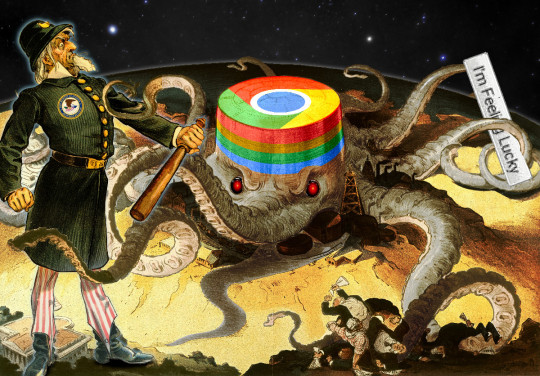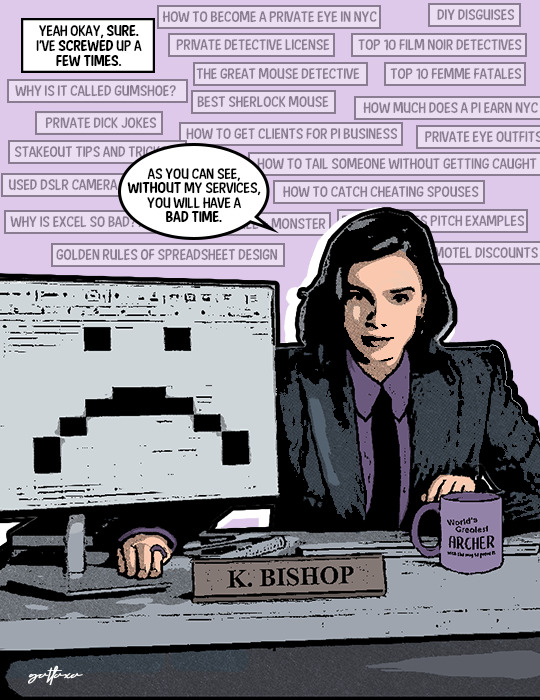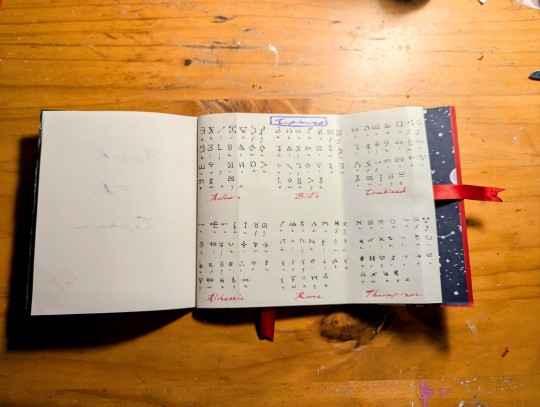#google-ads
Explore tagged Tumblr posts
Text

suck, and i cannot stress this enough, my cock to the fucking base
72K notes
·
View notes
Text
Check out my new blog :)
0 notes
Text
Hey, PSA:
On your phone, go to Settings> Security and Privacy> Privacy> Other Privacy Settings> Ads> Delete Advertising ID
Then go back to Other Privacy Settings> Google location history> Turn off Location History &/or Turn-on Auto-Delete (you can set a time period of how long to keep it)
Then, staying on Other Privacy Settings, go to '+ See all activity controls'> Web & App activity> Turn off (you can also turn-on Auto-Delete for here too)
Then Scroll down to Personalized ads> My Ad Center> Turn Off Personalized Ads.
Google has no business knowing/storing everything you do online, and knowing/storing where you go everyday. Turn it off.
These instructions are for an Android phone, IOS might be different. If you have IOS or another operating system feel free to add on with your own map to where they've buried these settings in your phone to help others.
#fuck ads#advertising#psa#phone safety#internet safety#important info#idk what to tag this#reblog to boost#google#location#fuck google#privacy#internet culture#internet privacy#turn off tumblr live#android#ios#samsung#tech#technology
42K notes
·
View notes
Text

Google finally did it. Is it time to switch to Firefox? I believe users should be in control of what they can install and use on their desktop or laptop. There's uBlock Origin Lite, which replaces the original uBlock Origin for Chrome and similar browsers. Give it a try.
1K notes
·
View notes
Text
PICKMYURL Performance Marketing: Empowering Your Business Growth PICKMYURL performancemarketing
In today's highly competitive business landscape, standing out and achieving success requires a strategic approach to marketing. Enter PICKMYURL Performance Marketing—a dynamic and innovative solution that empowers businesses to optimize their online presence, drive targeted traffic, and achieve remarkable results. This comprehensive platform combines cutting-edge technology, data-driven strategies, and expert guidance to maximize performance and unlock new opportunities for businesses across industries. In this article, we will delve into the key aspects of PICKMYURL Performance Marketing, exploring its benefits, features, and how it can help your business thrive in the digital realm.
Understanding Performance Marketing Data-driven Insights Targeted Advertising Conversion Optimization Performance Tracking Benefits of PICKMYURL Performance Marketing Increased ROI Enhanced Customer Engagement Scalability and Flexibility Real-Time Optimization Measurable Results and Transparency Industries and Applications SaaS and Tech Startups Local Businesses B2B Marketing
#performance-marketing#digital-marketing#marketing#online-marketing#affiliate-marketing#social-media-marketing#social-media#marketing-agency#seo#branding#business#advertising#digital-marketing-agency#ecommerce#marketing-digital#google-ads#content-marketing#design#marketing-tips#digital-agency#agency#affiliate#digital#agency-life#facebook-ads#graphic-design#marketing-strategy#google#lead-generation
1 note
·
View note
Text
The Google antitrust remedy should extinguish surveillance, not democratize it

I'm coming to DEFCON! On FRIDAY (Aug 9), I'm emceeing the EFF POKER TOURNAMENT (noon at the Horseshoe Poker Room), and appearing on the BRICKED AND ABANDONED panel (5PM, LVCC - L1 - HW1–11–01). On SATURDAY (Aug 10), I'm giving a keynote called "DISENSHITTIFY OR DIE! How hackers can seize the means of computation and build a new, good internet that is hardened against our asshole bosses' insatiable horniness for enshittification" (noon, LVCC - L1 - HW1–11–01).

If you are even slightly plugged into the doings and goings on in this tired old world of ours, then you have heard that Google has lost its antitrust case against the DOJ Antitrust Division, and is now an official, no-foolin', convicted monopolist.
This is huge. Epochal. The DOJ, under the leadership of the fire-breathing trustbuster Jonathan Kanter, has done something that was inconceivable four years ago when he was appointed. On Kanter's first day on the job as head of the Antitrust Division, he addressed his gathered prosecutors and asked them to raise their hands if they'd never lost a case.
It was a canny trap. As the proud, victorious DOJ lawyers thrust their arms into the air, Kanter quoted James Comey, who did the same thing on his first day on the job as DA for the Southern District of New York: "You people are the chickenshit club." A federal prosecutor who never loses a case is a prosecutor who only goes after easy targets, and leave the worst offenders (who can mount a serious defense) unscathed.
Under Kanter, the Antitrust Division has been anything but a Chickenshit Club. They've gone after the biggest game, the hardest targets, and with Google, they bagged the hardest target of all.
Again: this is huge:
https://www.thebignewsletter.com/p/boom-judge-rules-google-is-a-monopolist
But also: this is just the start.
Now that Google is convicted, the court needs to decide what to do about it. Courts have lots of leeway when it comes to addressing a finding of lawbreaking. They can impose "conduct remedies" ("don't do that anymore"). These are generally considered weaksauce, because they're hard to administer. When you tell a company like Google to stop doing something, you need to expend a lot of energy to make sure they're following orders. Conduct remedies are as much a punishment for the government (which has to spend millions closely observing the company to ensure compliance) as they are for the firms involved.
But the court could also order Google to stop doing certain things. For example, since the ruling finds that Google illegally maintained its monopoly by paying other entities – Apple, Mozilla, Samsung, AT&T, etc – to be the default search, the court could order them to stop doing that. At the very least, that's a lot easier to monitor.
The big guns, though are the structural remedies. The court could order Google to sell off parts of its business, like its ad-tech stack, through which it represents both buyers and sellers in a marketplace it owns, and with whom it competes as a buyer and a seller. There's already proposed, bipartisan legislation to do this (how bipartisan? Its two main co-sponsors are Ted Cruz and Elizabeth Warren!):
https://pluralistic.net/2023/05/25/structural-separation/#america-act
All of these things, and more, are on the table:
https://www.wired.com/story/google-search-monopoly-judge-amit-mehta-options/
We'll get a better sense of what the judge is likely to order in the fall, but the case could drag out for quite some time, as Google appeals the verdict, then tries for the Supreme Court, then appeals the remedy, and so on and so on. Dragging things out in the hopes of running out the clock is a time-honored tradition in tech antitrust. IBM dragged out its antitrust appeals for 12 years, from 1970 to 1982 (they called it "Antitrust's Vietnam"). This is an expensive gambit: IBM outspent the entire DOJ Antitrust Division for 12 consecutive years, hiring more lawyers to fight the DOJ than the DOJ employed to run all of its antitrust enforcement, nationwide. But it worked. IBM hung in there until Reagan got elected and ordered his AG to drop the case.
This is the same trick Microsoft pulled in the nineties. The case went to trial in 1998, and Microsoft lost in 1999. They appealed, and dragged out the proceedings until GW Bush stole the presidency in 2000 and dropped the case in 2001.
I am 100% certain that there are lawyers at Google thinking about this: "OK, say we put a few hundred million behind Trump-affiliated PACs, wait until he's president, have a little meeting with Attorney General Andrew Tate, and convince him to drop the case. Worked for IBM, worked for Microsoft, it'll work for us. And it'll be a bargain."
That's one way things could go wrong, but it's hardly the only way. In his ruling, Judge Mehta rejected the DOJ's argument that in illegally creating and maintaining its monopoly, Google harmed its users' privacy by foreclosing on the possibility of a rival that didn't rely on commercial surveillance.
The judge repeats some of the most cherished and absurd canards of the marketing industry, like the idea that people actually like advertisements, provided that they're relevant, so spying on people is actually doing them a favor by making it easier to target the right ads to them.
First of all, this is just obvious self-serving rubbish that the advertising industry has been repeating since the days when it was waging a massive campaign against the TV remote on the grounds that people would "steal" TV by changing the channel when the ads came on. If "relevant" advertising was so great, then no one would reach for the remote – or better still, they'd change the channel when the show came back on, looking for more ads. People don't like advertising. And they hate "relevant" advertising that targets their private behaviors and views. They find it creepy.
Remember when Apple offered users a one-click opt-out from Facebook spying, the most sophisticated commercial surveillance system in human history, whose entire purpose was to deliver "relevant" advertising? More than 96% of Apple's customers opted out of surveillance. Even the most Hayek-pilled economist has to admit that this is a a hell of a "revealed preference." People don't want "relevant" advertising. Period.
The judge's credulous repetition of this obvious nonsense is doubly disturbing in light of the nature of the monopoly charge against Google – that the company had monopolized the advertising market.
Don't get me wrong: Google has monopolized the advertising market. They operate a "full stack" ad-tech shop. By controlling the tools that sellers and buyers use, and the marketplace where they use them, Google steals billions from advertisers and publishers. And that's before you factor in Jedi Blue, the illegal collusive arrangement the company has with Facebook, by which they carved up the market to increase their profits, gouge advertisers, starve publishers, and keep out smaller rivals:
https://en.wikipedia.org/wiki/Jedi_Blue
One effect of Google's monopoly power is a global privacy crisis. In regions with strong privacy laws (like the EU), Google uses flags of convenience (looking at you, Ireland) to break the law with impunity:
https://pluralistic.net/2023/05/15/finnegans-snooze/#dirty-old-town
In the rest of the world, Google works with other members of the surveillance cartel to prevent the passage of privacy laws. That's why the USA hasn't had a new federal privacy law since 1988, when Congress acted to ban video-store clerks from telling newspaper reporters about the VHS cassettes you took home:
https://en.wikipedia.org/wiki/Video_Privacy_Protection_Act
The lack of privacy law and privacy enforcement means that Google can inflict untold privacy harms on billions of people around the world. Everything we do, everywhere we go online and offline, every relationship we have, everything we buy and say and do – it's all collected and stored and mined and used against us. The immediate harm here is the haunting sense that you are always under observation, a violation of your fundamental human rights that prevents you from ever being your authentic self:
https://www.theguardian.com/technology/blog/2013/jun/14/nsa-prism
The harms of surveillance aren't merely spiritual and psychological – they're material and immediate. The commercial surveillance industry provides the raw feedstock for a parade of horribles, from stalkers and bounty hunters turning up on their targets' front doors to cops rounding up demonstrators with location data from their phones to identity thieves tricking their marks by using leaked or purchased private information as convincers:
https://pluralistic.net/2023/12/06/privacy-first/#but-not-just-privacy
The problem with Google's monopolization of the surveillance business model is that they're spying on us. But for a certain kind of competition wonk, the problem is that Google is monopolizing the violation of our human rights, and we need to use competition law to "democratize" commercial surveillance.
This is deeply perverse, but it represents a central split in competition theory. Some trustbusters fetishize competition for its own sake, on the theory that it makes companies better and more efficient. But there are some things we don't want companies to be better at, like violating our human rights. We want to ban human rights violations, not improve them.
For other trustbusters – like me – the point of competition enforcement isn't merely to make companies offer better products, it's to make companies small enough to hold account through the enforcement of democratic laws. I want to break – and break up – Google because I want to end its ability to bigfoot privacy law so that we can finally root out the cancer of commercial surveillance. I don't want to make Google smaller so that other surveillance companies can get in on the game.
There is a real danger that this could emerge from this decision, and that's a danger we need to guard against. Last month, Google shocked the technical world by announcing that it would not follow through on its years-long promise to kill third-party cookies, one of the most pernicious and dangerous tools of commercial surveillance. The reason for this volte-face appears to be concern that the EU would view killing third-party cookies as anticompetitive, since Google intended to maintain commercial surveillance using its Orwellian "Privacy Sandbox" technology in Chrome, with the effect that everyone except Google would find it harder to spy on us as we used the internet:
https://www.thebignewsletter.com/p/googles-trail-of-crumbs
It's true! This is anticompetitive. But the answer isn't to preserve the universal power of tech companies large and small to violate our human rights – it's to ban everyone, especially Google, from spying on us!
This current in competition law is still on the fringe, but the Google case – which finds the company illegally dominating surveillance advertising, but rejects the idea that surveillance is itself a harm – offers an opportunity for this bad idea to go from the fringe to the center.
If that happens, look out.
Take "attribution," an obscure bit of ad-tech jargon disguising a jaw-droppingly terrible practice. "Attribution" is when an ad-tech company shows you an ad, and then follows you everywhere you go, monitoring everything you do, to determine whether the ad convinced you to buy something. I mean that literally: they're combining location data generated by your phone and captured by Bluetooth and wifi receivers with data from your credit card to follow you everywhere and log everything, so that they can prove to a merchant that you bought something.
This is unspeakably grotesque. It should be illegal. In many parts of the world, it is illegal, but it is so lucrative that monopolists like Google can buy off the enforcers and get away with it. What's more, only the very largest corporations have the resources to surveil you so closely and invasively that they can perform this "service."
But again, some competition wonks look at this situation and say, "Well, that's not right, we need to make sure that everyone can do attribution." This was a (completely mad) premise in the (otherwise very good) 2020 Competition and Markets Authority market-study on "Online platforms and digital advertising":
https://assets.publishing.service.gov.uk/media/5fa557668fa8f5788db46efc/Final_report_Digital_ALT_TEXT.pdf
This (again, otherwise sensible) document veers completely off the rails whenever the subject of attribution comes up. At one point, the authors propose that the law should allow corporations to spy on people who opt out of commercial surveillance, provided that this spying is undertaken for the sole purpose of attribution.
But it gets even worse: by the end of the document, the authors propose a "user ID intervention" to give every Briton a permanent, government-issued advertising identifier to make it easier for smaller companies to do attribution.
Look, I understand why advertisers like attribution and are willing to preferentially take their business to companies that can perform it. But the fact that merchants want to be able to peer into every corner of our lives to figure out how well their ads are performing is no basis for permitting them to do so – much less intervening in the market to make it even easier so more commercial snoops can get their noses in our business!
This is an idea that keeps popping up, like in this editorial by a UK lawyer, where he proposes fixing "Google's dominance of online advertising" by making it possible for everyone to track us using the commercial surveillance identifiers created and monopolized by the ad-tech duopoly and the mobile tech duopoly:
https://www.thesling.org/what-to-do-about-googles-dominance-of-online-advertising/
Those companies are doing something rotten. In dominating ads, they have stolen billions from publishers and advertisers. Then they used those billions to capture our democratic process and ensure that our human rights weren't being defended as they plundered our private data and put us in harm's way.
Advertising will adapt. The marketing bros know this is coming. They're already discussing how to live in a world where you can't measure clicks and you can't attribute actions (e.g. the world from the first advertisements up until the early 2000s):
https://sparktoro.com/blog/attribution-is-dying-clicks-are-dying-marketing-is-going-back-to-the-20th-century/
An equitable solution to Google's monopoly will not run though our right to privacy. We don't solve the Google monopoly by creating competition in surveillance. The reason to get rid of Google's monopoly is to make it easier to end surveillance.

If you'd like an essay-formatted version of this post to read or share, here's a link to it on pluralistic.net, my surveillance-free, ad-free, tracker-free blog:
https://pluralistic.net/2024/08/07/revealed-preferences/#extinguish-v-improve

Image: Cryteria (modified) https://commons.wikimedia.org/wiki/File:HAL9000.svg
CC BY 3.0 https://creativecommons.org/licenses/by/3.0/deed.en
#pluralistic#google#antitrust#monopolies#remedies#ad-tech#competition#power#doj v google#attribution
1K notes
·
View notes
Text
Once, Babylon seemed an invincible threat. Babylon is gone now; only archaeologists remember it.
We're still here.
Once, Rome seemed an invincible threat. Rome is gone now, only tourists remember it.
We're still here.
Once, the Crusaders seemed an invincible threat. The Crusaders are gone now, only historical dramas remember them.
We're still here.
Once, scapegoating for plague seemed an invincible threat. Those who scapegoated us are gone, long forgotten, the plague slain by antibiotics.
We're still here.
Once, the Inquisition seemed an invincible threat. The Inquisition is gone now, only comedians remember them.
We're still here.
Once, the rise of exclusionary nationalism seemed an invincible threat. Those nations have risen and fallen, the political movements that forged them remembered only by historians.
We're still here.
Once, the rise of Eugenics rendering us inferior vermin seemed an invincible threat. Eugenics has fallen, only historians and the scorned remember it.
We're still here.
Once, the Tsars both White and Red seemed invincible. The Tsars of both colors are gone now, and only a pale and thinly stretched shadow remembers them.
We're still here.
Once, the third Reich of Germany seemed an invincible threat. The Third Reich is gone now, and only desperate fools remember them.
We're still here.
Now, old new dangers have risen, those same desperate fools and former friends seeking scapegoats, who together seem invincible and inescapable.
But they, as with all things, will pass, in time.
And we will still be here.
#European cultural sphere diasporic traumas#Sepharadim and Mizrahim I appologize for not adding more bits for your own particular diasporic traumas#I'm not as familiar as I'd like and didn't want to get something wrong which I probably would if I relied on Google and wikis#diaspora#jumblr#jewish
1K notes
·
View notes
Text

Summer vacation, 4am.
Tons of easter eggs in this one! Click the image to find them (and for better quality ofc)
Close ups and process shots under the cut, description in alt text







#it's all post canon of course#btw you can't see but the paper on the floor has an episode description written on it#it's ep 53.5 which I made up. what's the plot you ask? pure fluff and highschool shenanigans. these kids deserve it#check out Taylor's Matryoshka shirt and Linc's Garfield pullover :3#also the building on the right may or may not be a Sonic's distribution center#I love being not-usamerican and just going on google streetview to research the San Dimas area.. looking at parking lots going ''ah! I see'#also#this one took me literal months... the cart's perspective was so hard to get right#so I just sat and stared at it for a couple minutes - added a couple of lines and erased some others - and then closed off my sketchbook lo#dndads#dungeons and daddies#dndaddies#dndads s2#scary marlowe#lincon li wilson#link li wilson#normal oak#normally oak swallows garcia#normal oak garcia#taylor swift dungeons and daddies#taylor swift dndads#taylor swift not that one#my art#yuviur
1K notes
·
View notes
Text
i find it funny that butch hartman is a huge scamming homophobe but he allows the character designers to make big, buff characters with small waist lines.
like okay freakster, you definitely have a thing for curvy waists




update: IM SORRY GUYS I NOW KNOW THAT BUTCH DIDN'T DESIGN LOTS OF THESE CHARACTERS
#butch hartman#danny phantom#ignore the fact that i added images from wiki or google#especially technus#like dude the small guy turned into a literal amateur bodybuilder#dp#danny phantom blog#dp blog#vlad has toothpick legs#okay guys i get it thank you for correcting me ily all
885 notes
·
View notes
Text


"So just how many cases have you gotten so far, Kate Bishop?" "I'll have you know that since the inaugural opening of Hawkeye Investigations, I've taken on 5 new, definitely real, definitely paid their deposits, clients." "And how many were of cheating wives and husbands?" "...Four... BUT! One of them was about a missing guinea pig. Yeah, that one was kinda weird."
#hawkeye#kate bishop#yelena belova#bishova#kate x yelena#kate bishop x yelena belova#yelena belova x kate bishop#hailee steinfeld#***#inspired by hailee's neutrogena ad#*slaps psds*#you can shove so many references in this thing#kate's a google fiend#yelena's mostly horrified at her search history#it reveals waaayy too much of kate's psyche#when kate runs her “why we should be PI besties <3” presentation is when yelena realises she's a down bad moron-sexual#and deals with it by throwing herself out the window#(kate doesn't notice because she's busy drawing her :) on her spreadsheet)
388 notes
·
View notes
Text
With M&Ms putting out more ads due to Halloween coming up, I would like to casually make sure everyone is aware...
The Peanut M&M is voiced by the same guy who voices Ford Pines and Cave Johnson.
...Do with that information what you will
#gravity falls#book of bill#billford#grunkle ford#ford pines#stanford pines#cave johnson#Peanut m&m x bill cipher#they are both yellow shapes with limbs#the book of bill#i realized this when Spotify gave me an ad for them snd after hearing this man voicing the peanut m&m my entire life it#it hit me like a truck when it clicked that its just fords voice but silly#i immediately googled it to check if my hypothesis was correct snd had to share
432 notes
·
View notes
Text
Worship. Appreciate. Perhaps scritch under his chin. Any offering will suffice.

happy (very late) black cat appreciation day! today I am thankful for my darling nyassel + my own (mostly) black kitty 🩷🐈⬛

#thank u l3earfat for enlightening me to a new holiday. i will be adding it to my google calendar#i used waaaaay too many blend modes but fuck it we ball as per usual#elkk.art#cat nap#sleep token#sleep token fanart#sleep token vessel
460 notes
·
View notes
Text


You get wrecked by a Heavy+Medic duo and see one of these taunts before you respawn. How do you react?
(aka: @cursed--alien and I were bullshitting about potential taunts that would kill homophobic gamer boys on sight and these shitty doodles are the result)
#gopher art#team fortress 2#heavymedic#red oktoberfest#tf2 medic#tf2 heavy#please imagine. im begging you.#if something to this effect got added i would pay so fucking much money for it. i dont give a fuck#also. we were discussing the hilarity of this being some squeaker's gay awakening. he gets annihilated by a heavymedic duo#and they tauntsmooch on his killcam. and he has to re-evaluate something. ie google “am i gay quiz”#see my vision boy
1K notes
·
View notes
Text


changed it a bit so if u saw this before no u didn’t
#fiddleford invents google to google am i gay quizzes#people’ve already interacted with the other version so i’m. just gonna keep it up i guess whatever bro#his torso was too long i think. it was bothering me lmfaooo#& added pens and pencils bc idk. studies yay#changed his body a little tiny bit#fidd stayed the same tho#agh hey guys i sure love giving up on a sketch & posting it then going Nvm and changing it again after#??!!#ahem.#hey.#gravity falls#fiddauthor#ford²#fiddlesix#stanford pines#fiddleford mcgucket#gravity falls fanart#my art#rystiart#this’s likely staying a sketch forever btw#will i ever make a finished piece ever again? who knows
301 notes
·
View notes
Text










In singular deranged days work (where I was supposed to be getting OTHER things done) I made a cipher journal for decoding the ciphers in Gravity Falls, specifically for Journal 3, the Book of Bill and thisisnotawebsite.com. This included (ultimately) three pages of common ciphers used in the Gravity Falls fandom; originally I was only going to do two, but then got to the Blendin page in Journal 3, sighed deeply and made an extra page on the Vignére cipher. The clasps I made myself by hand, and the little white toggle is a raccoon tooth, which I may change out depending on what becomes available. The purple ink, although unable to be seen within the photos, actually glitters and looks rather cosmic to my delight.
Considering I made the most of it within a day, it meant I used the paper I had at hand, which wasn't good paper for actual ink as it bleeds through slightly (and is thus unbecoming), but as a fancy schm-ancy idiot who insists on using actual ink with dip pens for the 'breadth of the experience', this means I'm ultimately only using one side of the paper (to my chagrin) and the letters aren't as clear as they could be when I write on the paper. Nevertheless, I am rather happy about the result; young me from about a decade ago, who began to make a similar journal only to abandon the project would have been immensely excited that I actually made one and am currently using it to decipher things within Journal 3. There is something rather satisfying about it, I do confess.
#rose serpent press#gravity falls#journal 3#the book of bill#thisisnotawebsitedotcom#ciphers#bookbinding#jesus why is blendins letter so fucking long and a vignere cipher like i get it but yeesh#also yes im aware if i Google i would get all the things deciphered. but where the ENJOYMENT IN THAT HUH???#also immensely delighted to be able to do pull out pages for the cipher pages fuck YEAH tactile gorgeous AND useful#was i obsessed with the description of the Book Dragon Riders map by cornelia funke? yes and what about it. i still LOVE the concept#after i added the vignere cipher page i wasnt gonna reshoot the book so theres no second ribbon horizontally. so u just gotta imagine it#btw i mixed the colours myself for the colour cipher. in watercolour. because i like to torment myself#which reminds me i do need to finish whitening the raccoon skull that hangs out under my desk. like its been there for ages.
155 notes
·
View notes